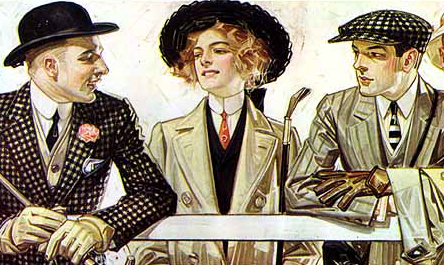Notes on what actually happened on day 19
and what actually happened…
We divided into our “superreader” groups…
We were asked to first review Monday’s discussion,
then invited to look more @
how the form of Watchman might be transformed to appeal to women;
the representations of gender and technology in the graphic novel;
the gendered script that female comic writers adhere to;
and what might happen if Superman had been a woman.
Are we supposed to learn from these representations
how to keep history from repeating itself?
What, in particular, about the problem of otherizing urban poverty?
Poverty and crime were presented as a force, rather than as people;
and they are strongly gendered (see esp. the representation of prostitution;
cf. also an on-line conversation re: “urban terror” in our school systems).
What emerged when we came back to share our thoughts with the entire class:
some alternate views to make it more female-friendly:
more attractive fashions, focus on relationships, cuter animals,
less gruesome deaths, more accessories, more feminine technologies…
(these are very stereotypical notions of what women like;
would they appeal to the sort of women who read comic books?)
There are graphic novels written for women: Fun Home, Ghost World, Persepolis….
But so was this one! Why is Watchmen so appealing to women?
The book was really written for over-analytical women: self-reflective, ironic appeals to women.
It makes fun of male fantasy of super-heroes. We like the analysis and way of thinking, the way it makes you think (not the violence).
The men in this book are powerful, and buff, but not sexual. The male bodies are not eroticized/sexualized; is this a cultural norm? A lot of sexualization has to do with veiling part of the body: it’s limiting. Total nudity is less attractive.
Female superheroes appeal to men, not women, and were sexualized to do so.
But think of “hot bod” commercials, which do sexualize men’s bodies, w/ women watching from a distance (cf. the upclose and personal male gaze: it’s much more intense). Men’s bodies are sexualized in our culture.
What images do we view as erotic, for men or women? Might the same outfit, same position, seem erotic if worn/performed by women, not by men?
Being naked makes Dr. Manhatten more machine-like, not more human-appearing.
Of interest: that a conversation about how to write texts that appeal to men and/or women has turned into a conversation about eroticization, about what each gender finds arousing. There are appeals that are not erotic ones.
The unspoken question is why Dr. M isn’t erotic: do we lose any nherent desire/attraction, because he is so out there/visible. Or is it because he is not human? Those characteristics are stripped away. There is a taboo aspect.
But then why is paranormal romance so popular? (that’s a human/not-human pairing….). It’s because of the gestures, the opening-up, because of the action that eventually happens.
If we swapped the gender of all the characters, we might have liked a number of them (like Laurie) more; others (like Rohrshach) would not be any different (because he is so not-female). Would that make it more a comic for women? Putting a queer twist on it?
What about transgendered figures (avoid becoming a hooker, by becoming a man)?
Most of Watchmen is so intentional; but the treatment of class and race issues seems not to be ironic. All the superheroes are white, but the boy reading the comic is not (does his race matter? Does the race of the psychiatrist matter?) It’s bizarre that race would not be treated more self-consciously or problematically, given that the rest of the book is so tightly crafted.
Could the book be read as a critique of the gang culture of the 80’s?
The psychiatrist loses most of his hopeful attitude on the world; is it significant that he is African-American?
The child is the reader; what do we do with his subject-position? Is he a model for us (since we are readers)?
Drawing on sociology theories: the psychiatrist is so hopeful because he has been rewarded by the opportunity structure; the child has not had a chance to grow up to be him. If he is so involved in the comic world, what is his perception of the world?
There is some hope in the world: Dan and Laurie go on working.
The child doesn’t throw away the book as not making sense; he keeps reading it over and over because he doesn’t understand it.
What’s the point of learning history if we are going to repeat it? One point might be that we need to hear it many times; we can’t learn anything in one try.
But: all attempts to improve the situation don’t. The whole notion of learning and changing gestures toward a belief, common to many comic books, in immortality. In this book, however, there is no immortality.
What is the use of this book? Dark humor can be effective, making it easier to think about these things. The textual commentary grounds it in the world, makes it feel more real.
It can be tiring, trying to improve the world when it doesn’t improve. This book, with all the bitterness of the cycle, functions as a pep talk.
No!

Comments are closed.